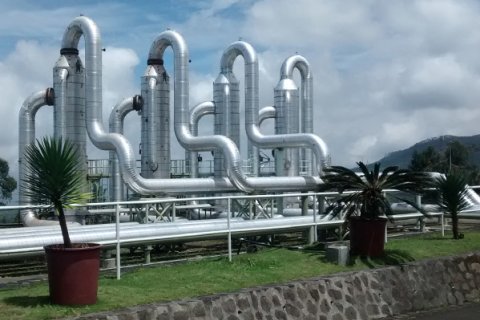The Earth as a source of energy
First geothermal power station in Utrecht

Clean energy from geothermal heat: together with various parties, Utrecht University is exploring the possibility of building the first geothermal power station in Utrecht.
Clean energy sources are vital if climate goals are to be achieved. Geothermal energy shows great potential, but as yet little is known about the possibility of using it on a large scale. Geothermal energy is sustainable, scalable and is produced continually, 24/7. And moreover, it takes up relatively little space above ground.
Utrecht University earth scientists have a wealth of knowledge in the field of tectonics, geophysics and seismology, which is essential for geothermal research. For their research, they are using the predictive models developed by Jan-Diederik van Wees, earth scientist at Utrecht University and TNO.
‘Shallow depth’
In Utrecht, it is possible to generate geothermal energy at a depth of just three kilometres. The university is working with various parties within the LEAN research project to research the use of energy from this relatively shallow depth to supply energy to areas of Utrecht. The researchers are particularly exploring whether it is sufficiently worthwhile generating geothermal energy at this depth in regard to several potential sites. Test drilling should indicate whether this is the case. Besides this, the safety of geothermal energy – ruling out the possibility of earthquakes and the escape of reservoir water or gas – is an important condition for the parties in the creation of a geothermal power station.
If the research shows that producing geothermal energy at this depth is both profitable and safe, the first geothermal power station in Utrecht, heating almost 3,000 households, will come into operation in 2020. The current cooperating parties are committed to working towards this goal. The ultimate aim is to provide this form of energy to 35,000 households which are currently supplied by district heating. Around 20 small-scale geothermal power stations will be needed for this.
Ultra-deep geothermal energy
Geothermal energy can also be produced at greater depths under the ground. Known as ultra-deep geothermal energy, this is largely unknown territory. In the GOUD project, Utrecht University and various other parties are together conducting research into tapping into heat at a depth of four to ten kilometres under the ground.
Together with UMC Utrecht, Utrecht University of Applied Sciences, Kantorenpark Rijnsweerd and ASR Verzekeringen, the university is exploring the possibility of using ultra-deep geothermal energy in the Rijnsweerd industrial estate and Utrecht Science Park the Uithof. A heating network is already in place here and there is demand for heating from various companies and institutions. The researchers are charting the subsurface and will be working together with the Ministry of Economic Affairs and Climate Policy. The first results are expected at the end of 2018.
If the research results are positive, the cooperation partners will be able to develop an ultra-deep geothermal power station in the Utrecht Oost district. This should supply the first energy in 2021. This project contributes to the city of Utrecht's ambition to be energy neutral by 2030 and thus also to the national goal of having a nearly emission-free energy supply by 2050.
Mexican know-how
The Utrecht researchers are also increasing their know-how on ultra-deep drilling, at over four kilometres, by working together with colleagues in Europe and Mexico on the GEMex project. The Earth’s crust in Mexico is different to that in the Netherlands. In Mexico, it takes a depth of just one to two kilometres to reach about 130 to 300 degrees Celsius, whereas in the Netherlands it takes at least a depth of four km to reach that temperature. The GEMex project allows for relatively shallow boring to develop knowledge for the development of ultra-deep geothermal energy in the Netherlands at low cost.
Sustainability at Utrecht University
By combining its expertise in the field of sustainability, Utrecht University develops integrated solutions for sustainability issues contributing to a better future for following generations. This theme connects Utrecht’s excellent sustainability research spanning many different disciplinary fields, including the humanities, natural sciences and social sciences. Pathways to Sustainability is one of the four strategic research themes at Utrecht University.

